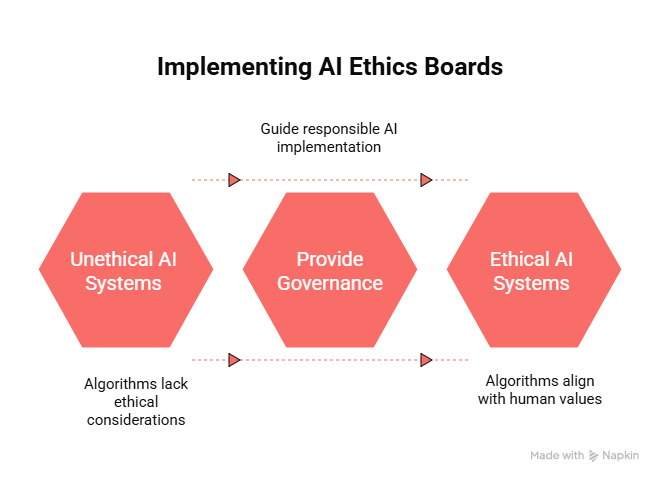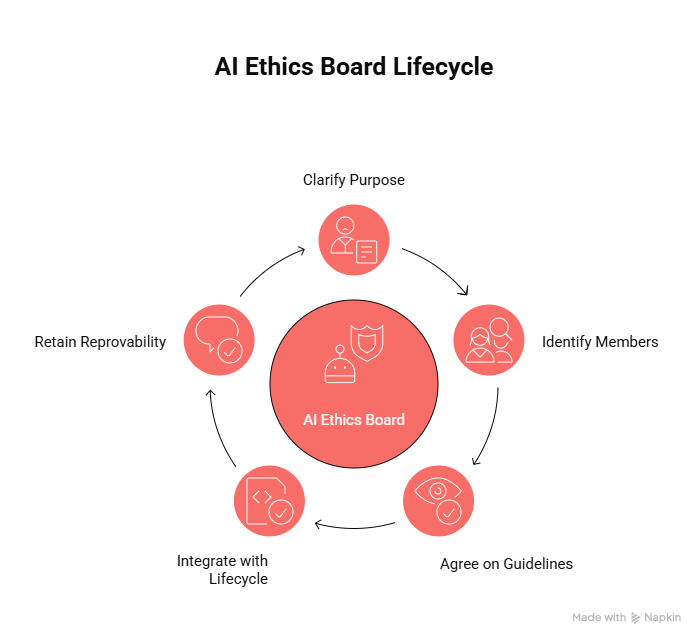Introduction: AI Ethics Boards — A New Business Imperative in 2025
AI is no longer experimental—it’s mission-critical. From hiring to healthcare, artificial intelligence systems are making decisions with real-world impact. But with this power comes a new responsibility: ethics.
In 2025, businesses are waking up to the risks of ungoverned AI. From biased algorithms to non-compliance with global AI laws, the stakes have never been higher. That’s where the AI Ethics Board comes in.
An AI Ethics Board helps organizations ensure their AI systems are ethical, accountable, transparent, and aligned with human values. Yet, many businesses—especially startups and scale-ups—still delay setting one up.
Let’s uncover the risks of ignoring AI ethics and how building an AI Ethics Board now gives you a competitive advantage.To complement ethical governance, you may also explore our AI Automation Services in Canada for compliant AI implementation.

The Problem: AI Moves Faster Than Ethics Can Keep Up
Despite good intentions, AI systems often:
- Amplify bias and discrimination
- Violate privacy
- Operate without human accountability
- Cause reputational or legal damage
Real-World Example
In 2023, a major bank’s AI lending system was found to approve white applicants at nearly double the rate of Black applicants—despite similar credit scores. The result? Lawsuits, brand damage, and consumer distrust.
The message is clear: AI without ethics is a risk.
Why Skipping the Ethics Process Is a Mistake
When organizations skip or delay forming an AI Ethics Board, they face:
- Legal exposure (GDPR, CCPA, EU AI Act)
- Biased outcomes
- Damaged stakeholder trust
- Product recall or suspension
- Regulatory non-compliance in 2025
In fact, the EU AI Act is set to enforce AI risk classification and oversight, making governance a legal requirement—not just a “nice to have.”
Read more about the EU AI Act
The Solution: Build an AI Ethics Board in 2025
What Is an AI Ethics Board?
An AI Ethics Board is a formal group—cross-functional in nature—that evaluates AI use cases for:
- Bias, discrimination, and fairness
- Regulatory compliance
- Ethical and societal impact
- Model transparency and risk
It aligns your AI development lifecycle with governance, legal, DEI (Diversity, Equity, Inclusion), and compliance best practices.For help defining your AI ethics board framework, check out our AI Consulting Services.
Why Your Business Needs an AI Ethics Board
1. Protect Your Brand Reputation
One ethical misstep with AI can lead to a massive PR nightmare. AI Ethics Boards catch these risks before launch.
Think: Would you trust an AI-driven product that can’t explain its decision-making?
2. Ensure Legal Compliance
Laws like the EU AI Act, Algorithmic Accountability Act (USA), and Canada’s Artificial Intelligence and Data Act (AIDA) are reshaping compliance in 2025.
A well-structured AI Ethics Board helps you stay ahead of compliance mandates.
Learn how AI laws are evolving in Canada
3. Enable Responsible Innovation
Contrary to popular belief, ethics accelerates innovation. By enabling risk-aware experimentation, you gain confidence to scale.
Ethics is not a blocker. It’s a framework for bold, trustworthy innovation.
4. Build Public Trust
As AI touches sensitive areas (health, justice, hiring), transparency builds user trust.
With a board, you can:
- Publish model cards
- Share audit logs
- Provide explainability
This signals responsibility to customers, investors, and partners.
5. Foster Cross-Team Alignment
AI ethics doesn’t sit with one department. Your board becomes a unifier of:
- Data scientists
- Legal teams
- HR/DEI reps
- Compliance officers
- External academics or ethicists
This collaboration builds a culture of accountability.
IEEE’s Ethically Aligned Design offers robust frameworks for bias and explainability checks.
How to Build an AI Ethics Board That Works
Step 1: Define Its Charter
- Advisory or decision-making?
- Focus on bias? Privacy? Compliance?
- Does it review or approve high-risk models?
Step 2: Pick the Right Members
Diversity is key. Include voices from:
- AI/ML
- Legal & Compliance
- DEI/HR
- External ethicists
- Product leadership
Step 3: Create a Review Framework
Boards must be equipped to assess:
- Fairness metrics
- Data provenance
- Audit trails
- Explainability
Use tools like SHAP, LIME, and Credo AI for review.
Step 4: Integrate with the AI Lifecycle
Ethics cannot be post-production. Integrate checkpoints into:
- Data sourcing
- Model training
- Deployment
- Monitoring & retraining
Step 5: Share & Document
Transparency is accountability. Maintain logs of:
- Decisions made
- Bias tests
- Disagreements and resolutions
- Publish external summaries for high-impact models
An effective ethics board works closely with your dev team—consider our Custom Software Development Company services for seamless integration.

Real-World Case Studies: Ethics Boards in Action
Salesforce
Their Office of Ethical and Humane Use ensures all AI features align with company values.
Microsoft
Their AETHER committee reviews AI initiatives for legal and ethical implications.
Google DeepMind
Set up a multi-disciplinary ethics board—although criticized for lack of transparency, it shows that ethics must be visible, not hidden.
Overcoming Common Challenges
| Challenge | Solution |
|---|---|
| Resistance from Teams | Bring stakeholders in early. Share success stories. |
| Lack of Expertise | Partner with universities or ethicists. |
| Slowed Development | Create pre-approved guidelines, templates, and fast-track pathways. |
Let’s Build Ethical AI Together
Is your organization prepared to govern AI responsibly?
Book a free AI governance consultation with our experts.
We’ll help you build your AI Ethics Board from the ground up.
Schedule your AI Ethics Consultation
FAQs – AI Ethics Boards
Q1. What is the purpose of an AI Ethics Board?
It ensures AI systems are reviewed for fairness, transparency, and compliance before being deployed.
Q2. Who should be on the board?
Diverse experts—AI engineers, legal, compliance, DEI, and ethicists.
Q3. Is it mandatory?
Not yet everywhere—but legal and stakeholder expectations in 2025 demand oversight.
Q4. Is it just for big companies?
No. Even startups benefit from lightweight ethics frameworks early.
Q5. What’s the difference between ethics and governance?
Governance is the policy. Ethics is the people enforcing those values.
